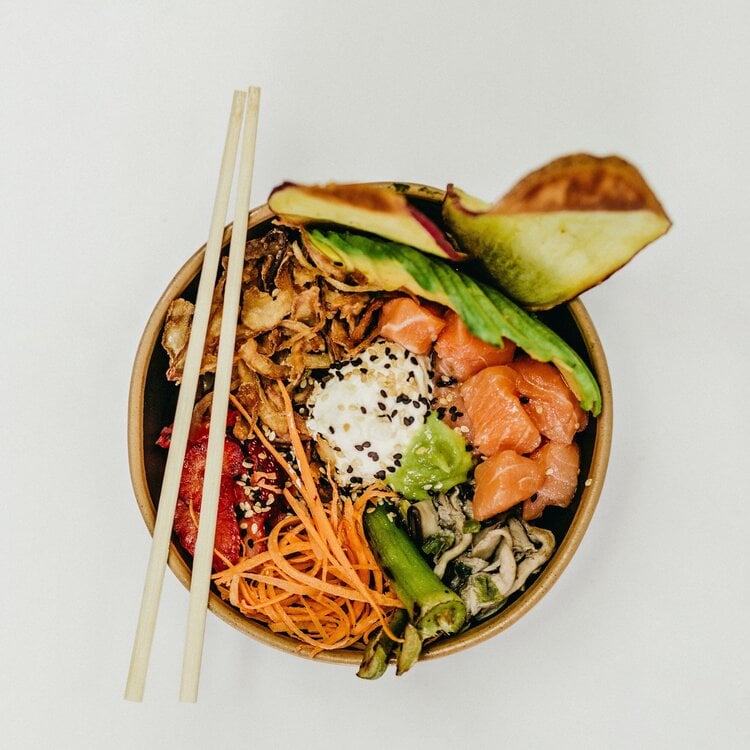Food Therapy

What is Food Therapy?
At Tranquility Base Acupuncture, we believe that food is medicine. The right nutrition can help heal the body, improve overall wellness, and restore balance. Our food therapy services integrate both Traditional Chinese Medicine (TCM) principles and modern nutritional science to create a customized approach tailored to your unique health needs.
By understanding how different foods affect your body, we design personalized nutrition plans that promote digestion, reduce inflammation, boost immunity, and enhance energy levels. Whether you’re dealing with chronic conditions or simply looking to improve your well-being, food therapy provides a natural, effective way to support your health.
How Can Food Therapy Help You?
Food plays a vital role in overall health, acting as both nourishment and medicine. The right dietary choices can help restore balance, improve bodily functions, and support long-term wellness. By assessing your body’s constitution, current health condition, and nutritional needs, we create a personalized plan to enhance your well-being.
Improve digestion and gut health.
Boost energy and metabolism.
Strengthen the immune system.
Reduce inflammation and chronic pain.
Support hormonal balance.
More About Food Therapy
What can I expect from a food therapy consultation?
Each food therapy plan begins with a comprehensive assessment of your health and dietary habits to create a customized approach that supports your wellness goals.
Step 1: Initial assessment
- A discussion of your current health concerns and goals
- A review of your dietary habits and nutritional intake
- An evaluation based on TCM principles (yin-yang balance, hot/cold foods) and modern nutrition
- Identification of potential food sensitivities or deficiencies
Step 2: Personalized food and supplement recommendations
- A customized list of beneficial and avoidable foods
- Suggestions for herbs, supplements, and superfoods
- Easy-to-follow meal planning tips
- Guidance on portion sizes and meal timing for optimal digestion
Step 3: Ongoing support and adjustments
- Follow-up guidance to track progress
- Adjustments to your diet as needed
- Support for seasonal or lifestyle changes
- Recommendations for mindful eating practices to enhance digestion and well-being
What are examples of foods that support healing and better overall health?
We provide detailed food and supplement guides after your initial consultation, customized to your needs. Here’s a general look at how food can support different health concerns:
| Health Concern | Recommended Foods | Avoid These |
| Digestion Issues | Ginger, bone broth, fermented foods (kimchi, yogurt) | Processed foods, dairy (if intolerant), fried foods |
| Low Energy and Fatigue | Oats, quinoa, leafy greens, nuts, and seeds | Excess caffeine, sugary snacks, refined carbs |
| Inflammation and Pain | Turmeric, salmon, blueberries, green tea | Processed meats, sugar, alcohol |
| Stress and Anxiety | Chamomile tea, dark chocolate, whole grains | Caffeine, alcohol, highly processed foods |
| Hormonal Imbalance | Flaxseeds, avocados, wild-caught fish | Soy (for some people), refined sugar, alcohol |
Is food therapy right for you?
Food therapy is an excellent choice for those looking for a natural way to support their health. It can be beneficial if you struggle with digestive issues, inflammation, low energy, hormonal imbalances, or a weakened immune system. It may not be the best approach for everyone, particularly if you have severe food allergies, specific dietary restrictions, or a medical condition requiring specialized treatment. If you’re unsure, a consultation with a trained practitioner can help determine whether food therapy is a good fit for your needs.
Frequently Asked Questions
Hidden
Hidden
What is food therapy in Traditional Chinese Medicine?
Food therapy in TCM focuses on using specific foods to restore balance in the body. Foods are categorized by their energetic properties (warming, cooling, damp, dry, etc.), and dietary recommendations are tailored to support your unique constitution.
How does food therapy differ from a regular diet plan?
Unlike general diet plans, food therapy takes into account your body’s imbalances, current health conditions, and TCM principles to create a fully personalized approach.
Can food therapy help with digestive issues?
Yes. Food therapy can support digestion by recommending gut-friendly foods and avoiding triggers like processed foods, excess dairy, and sugar.
Will I receive a specific meal plan?
While we don’t provide a strict meal plan, we do offer detailed food lists and guidelines so you can easily incorporate beneficial foods into your daily routine.
Do I need to follow a specific diet for a long time?
Your dietary recommendations may evolve as your health improves. We provide follow-up support to adjust your plan as needed.
Are supplements included in food therapy?
Yes, we may recommend certain supplements to complement your diet, but food is always the primary focus.
How soon can I expect results from food therapy?
Results vary depending on your health condition and consistency with dietary changes. Some people notice improvements within weeks, while others may take longer to experience full benefits.


